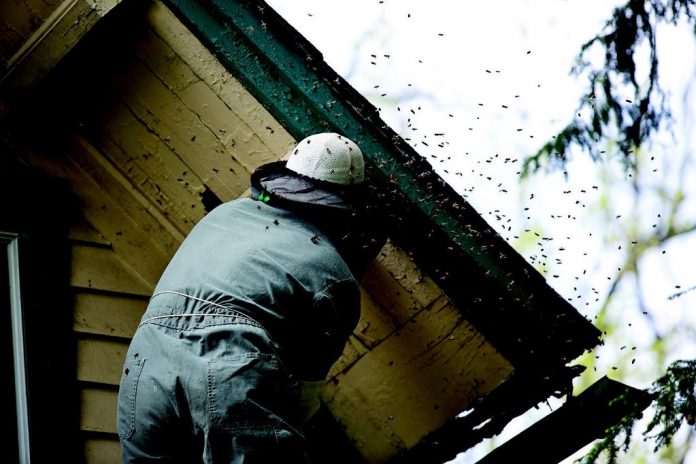Joel Eckel climbs up to the rafters to remove a bee honeycomb from a gatehouse at Glen Foerd on the Delaware. KEVIN COOK / FOR THE TIMES
— The bees must be skillfully removed, relocated and preserved because of their ecological and economic importance.
Birds and bees filled the agenda at Glen Foerd on the Delaware on a recent Saturday, but the day’s public programming had nothing to do with hanky-panky.
In fact, it was largely educational.
That morning, about 15 amateur ornithologists spotted an oriole, a common loon and other avian species during the Spring Bird Walk at the 19th century mansion. Then in the afternoon, two beekeeper siblings demonstrated their rare craft by removing a decades-old honeybee hive from the rafters of the historic estate’s gatehouse.
And in a surpising coincidence, Joel and Jeff Eckel of Germantown-based We Bee Brothers discovered only after accepting the job that they are distant relatives of Glen Foerd’s wealthy longtime owner, the late Florence Foerderer Tonner.
Tonner was the cousin of Joel and Jeff’s paternal grandmother. So the bee removal allowed the brothers, along with their father Phil Eckel, to play a part in the preservation of what might be loosely considered an ancestral home.
Sadly, there was no inheritance to be had for the Eckels.
“I was wondering about that,” Jeff Eckel joked after he and Joel removed tens of thousands of bees from the gatehouse.
Glen Foerd, at 5001 Grant Ave., is owned by the city’s Department of Parks and Recreation, which leases the 18-acre tract for a nominal annual fee to a community-based, non-profit conservation corporation.
Meg Sharp Walton is the executive director. She learned about the bees last fall when a longtime gatehouse tenant informed her of the hive in advance of moving.
“He said, ‘Oh, by the way, there’s a beehive and it was there when I arrived,’” Walton recalled.
The former tenant had been renting the place for the last 18 years. The bees never had posed enough of a disturbance to warrant attention. Nonetheless, Walton knew the bees had to go before she could place the four-bedroom gatehouse back on the rental market.
“There’s potential for honey to leak and do damage to the walls,” Jeff Eckel said. “Bees can be a nuisance if they swarm and cluster in your yard. (And) if the bees leave, (the hive) can get too hot, drip and attract other pests.”
It didn’t take long for Walton to find We Bee Brothers. According to 27-year-old Jeff Eckel, the company is about four years old and one of only a handful of practicing commercial beekeepers in the city.
And despite sharp declines in domesticated honeybee populations in recent years, wild or feral colonies still pose a common nuisance, particularly in urban areas. The bees must be skillfully removed, relocated and preserved because of their ecological and economic importance.
“They say thirty percent of our food is pollinated by honeybees,” Eckel said.
The beekeeper’s job is demanding.
At Glen Foerd, the brothers and their father constructed a multi-tiered scaffolding just to reach the nook that the bees called home. The brothers donned jumpsuits, gloves, bucket hats and facial netting. Joel climbed some 30 feet to the rafter and sawed away some century-old roofing boards to reach a hefty honeycomb, much to the disgust of thousands of bees guarding the site.
“The hive had swarmed a week or two before, so there wasn’t a full colony of bees. But there was a lot of comb and capped brood in there,” Jeff Eckel said.
Eckel explained that bees swarm when the colony grows and splits. Some of the bees will scout for new locations to colonize, then return to the hive to alert their queen and the rest of the bees to the new nesting spot.
Meanwhile, “capped brood” is the term for the developing larva and pupae that are encapsulated by wax in the honeycomb cells.
Typically, a full colony has 50,000 to 60,000 bees. The Glen Foerd colony had about half that. But the Eckels found 10 to 15 developing queens in the comb, including three that were close to hatching.
“Generally, the first queen out (of her cell) will go and chew out all of the other (unhatched) queen cells to ensure her position,” Eckel said.
Salvaging queens is a primary objective for beekeepers because the worker bees always return to the queen, even if the keepers take her elsewhere.
To move the colony, the Eckels separated the comb into manageable segments and installed them into wooden frames. The frames slide into a custom-made box. Phil Eckel is a retired industrial arts teacher and does all the carpentry work for the brothers.
After removing the colony, the Eckels returned to the gatehouse at dusk to catch any straggler worker bees that had been away from the hive earlier in the day.
In time, Walton hopes to have a hive installed elsewhere on the Glen Foerd grounds to keep bees in the area and support the estate’s flowering gardens.
“We’ll be getting a hive, one you stick on the ground, and we will be doing educational programming,” the director said. “Florence (Tonner) and her mom were really into horticulture, and with the bees, it’s a nice way of teaching it.” ••





